The Strongman’s Demise
Why Accountability Tests the Illusion of Untouchable Power?
There’s a seismic shift happening in the Philippines, as allegations of massive corruption against former President Duterte and Senator Go hit the courts. I’m diving into why this isn’t just a local legal battle, but a global struggle against unchecked power, and what it means for all of us who believe in justice.
The Big Question: Can Power Evade Accountability?
Have you ever wondered why it seems so incredibly difficult to hold the most powerful people accountable? It’s a question that has haunted societies for millennia. We see leaders, often charismatic and commanding, who build an image of being untouchable, almost above the law. This ‘strongman’ persona can be incredibly alluring, especially in times of uncertainty, offering a seductive illusion of stability. But beneath that façade often lies a dangerous truth: unchecked power breeds corruption. For me, this isn’t just political theory; it’s a fundamental challenge to the very idea of a fair society. Can our institutions, designed to be impartial, actually stand up to the immense pressure exerted by those who once commanded a nation?
Unpacking the Allegations: Billions on the Line
Right now, the Philippines is wrestling with this exact question in a very real, high-stakes court battle. Former Senator Antonio Trillanes IV has courageously filed plunder and graft charges against former President Rodrigo Duterte and his long-time ally, Senator Bong Go. We’re talking about an alleged P7 billion – yes, billion – in illicit contracts, supposedly funneled through CLTG Builders, a company said to be connected to Go’s family. These charges aren’t just numbers; they represent public funds that could have built schools, hospitals, or roads. They are a stark reminder of the temptations that power presents. As the brilliant Hannah Arendt observed:
The most radical revolutionary will become a conservative the day after the revolution.
– Hannah Arendt
In this context, it speaks to how quickly revolutionary zeal for change can morph into a desire to preserve one’s own power and privilege, often at the expense of the very people they vowed to serve.
Why This Echoes Beyond the Philippines
You might be thinking this is just a story about one country’s politics, but I assure you, its implications are far more universal. This struggle against alleged corruption and impunity is a battle many nations face. When leaders, past or present, are perceived to be above the law, it corrodes the very essence of democracy. It tells ordinary citizens that the rules don’t apply equally, fostering a deep cynicism that makes people disengage from public life. The universal human weakness we confront here is the comfortable silence that allows willful ignorance to become a collective habit, sacrificing justice for perceived stability. When we allow ourselves to look away, we inadvertently become complicit in the erosion of our own rights and freedoms. As Václav Havel, the Czech playwright and former president, powerfully wrote:
The moment someone tries to tell you that you are just a speck of dust, that you are merely a small cog in a huge machine, that you are just a number, that your opinion doesn’t matter, that you are just a tool to be used, you have to resist with all your might.
– Václav Havel
His words remind us that resisting the normalization of corruption is not just a political act, but an existential one, a refusal to be reduced to a mere spectator in our own civic lives.
Go Deeper
Step beyond the surface. Unlock The Third Citizen’s full library of deep guides and frameworks — now with 10% off the annual plan for new members.
Our Role in the Fight for Justice
So, what does this mean for us, the citizens who believe in a more just world? It means we cannot afford the luxury of apathy. We have a profound role to play in demanding accountability, no matter where we live. This case in the Philippines isn’t just about the individuals charged; it’s about testing the strength of institutions, the integrity of the legal system, and the resilience of a populace. You can contribute by staying informed, asking critical questions, and supporting organizations that champion transparency and good governance. It’s about cultivating a collective intolerance for corruption, recognizing that the health of a democracy is a direct reflection of its citizens’ engagement. Let’s remember that the illusion of untouchable power crumbles only when confronted by an unyielding demand for truth and justice from an awakened citizenry.



